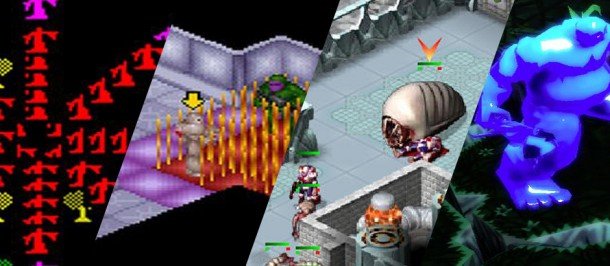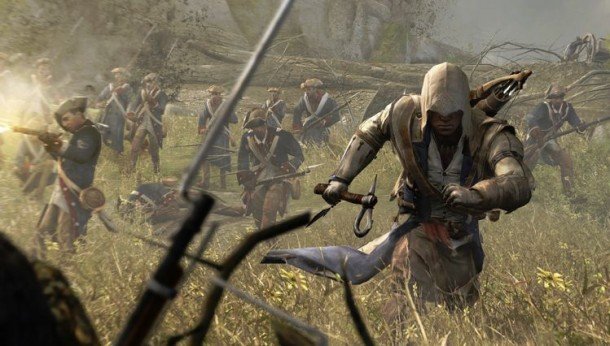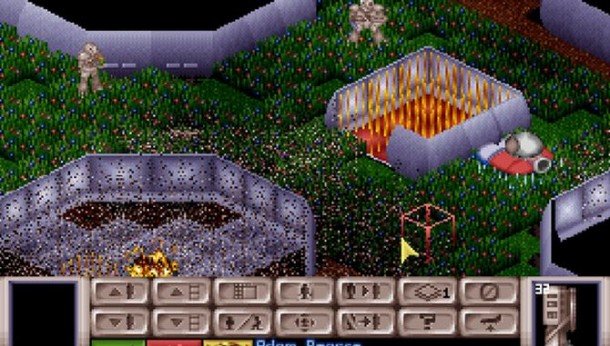Julian Gollop interview: on X-Coms old and new, the Ghost Recon strategy game that never was, AI, auteurs and "Fork My Fruit"

Julian Gollop is a 27+ year veteran of the industry. He can list classics like Chaos, Laser Squad and, of course, X-Com, on his long career resume. As Firaxis successfully reboot X-Com for modern audiences with Enemy Uknown, Gollop has donned indie threads to pursue a current remake of his multiplayer wizard-duelling game, fittingly named Chaos Returns. I caught up with him at GDC for an affable chat about his work on the original X-Com, progress on the new Chaos game, and his thoughts on how the great machine of modern development compares to the tiny teams in operation during the turn-based-strategy boom.

The interview's a big 'un. Here's what you'll find on each page if you fancy skipping to a part that interests you.
- Page 2 : How auter-led development compares to Gollop's position in the original X-com team, and details of his new indie project, Chaos Reborn.
- Page 3: Expanding Chess, "Fork My Fruit," the aborted "XCOM meets Ghost Recon" pitch and Gollop's thoughts on the modern version of XCOM.
- Page 4 : Gollop's love of boardgames, the story behind Terror from the Deep and XCOM: Apocalypse and Gollop's favourite recent games.
PC Gamer: In the original XCOM, the way the AI moved towards you, they would make use of cover and they weren't completely suicidal.
Julian: No, they weren't. I can't remember exactly how we did the AI in the original XCOM, but a lot of the time I tried to avoid moving into the direct line of fire of your guys. They tried to find cover if they could, most of the time.
PC Gamer: The new XCOM has that for the Sectoids and the Floaters and the Thin Men, which were the Men in Black which you couldn't put in because Microprose were making another Men in Black game. They had quite a complicated AI system for them, but anything which was melee orientated just ran straight towards the nearest target. You're talking about AI here (GDC) as well.
Julian: I went out of interest because back in 1995 when I was coming to GDC, guys like Neil Kirby, I was involved in their round tables. Every year we used to go to it. There weren't that many AI programmers around at that time. A lot of them were actually involved in RTS games because that was the big thing that killed off turn-based games.
PC Gamer: I remember it well. After Dune II...
The biggest gaming news, reviews and hardware deals
Keep up to date with the most important stories and the best deals, as picked by the PC Gamer team.
Julian: After Dune II... I mean, XCOM was really just at the end of the period where you had this turn-based strategy game as being a mainstream game.
PC Gamer: They're coming back now, but they're not coming back as mainstream games.
Julian: Not as mainstream games, no, because in those days, you had XCOM, Master of Magic and Master of Orion were, for me, phenomenal games. Colonisation, of course, came a bit later.
PC Gamer: I guess there were The Heroes of Might and Magic kind of games.
Julian: Yeah, Heroes of Might and Magic developed a trend, but they weren't in quite the same tradition of this grand strategy game which had big random elements in the generation of world, lots of AI and stuff. Heroes of Might and Magic is a bit of an exception. In those days, I believed firmly that the future of computer games was all about AI. That in twenty years time we'd be interacting with NPC characters in computer games that actually had real intelligence and could respond to you in really intelligent ways. Boy, I was wrong. So wrong!
PC Gamer: Do you think it didn't happen because we never built on anything we built? As in, every time people build AI they build it anew, there aren't AI libraries as far as I know.
Julian: I think part of the problem is a lot of effort was put more into graphics rather than anything else.

PC Gamer: It can be seen to raise review scores, sadly.
Julian: Because it's the thing that immediately impresses people. As soon as you start interacting with a world of pretty graphics then you realise that actually it's not so interesting. It may be pretty but it's not really that interactive. It's always bugged me about the way computer games developed over the years. Even if you take Assassin's Creed, a phenomenally complex game with all these NPCs wandering around, it is nothing but an elaborate paper thin illusion, to be honest.
PC Gamer: It's a paper thin illusion which is very clear about saying, "This is an illusion". Inside the game, the framing device that they use to make it a series rather than a random collection of games by the same name, there's a person playing a game within a simulation.
Julian: It is, but then again - yeah, that's true. (laughs)
PC Gamer: It feels to me like a huge joke, that they've done that. "How can we get away with making a game with paper thin mechanics, which are quite obviously mechanical? Oh, we'll a simulation inside a game".
Julian: You could say that, yeah. I mean, computer games didn't develop really in that direction, and I guess what people enjoy and what they like at the psychological level is more to do with having their own ego massaged in certain ways through these very simple reward cycles.
PC Gamer: It always struck me as interesting in the Turing test stuff, that it's not that AI ever passes the Turing test but people fail the Turing test. When you have the awards in England, it's always somebody pretending to be a robot which causes an AI to pass the Turing test. Not an AI actually being convincing in any way. And there's something about it being easier to fake intelligence than it is to even get anywhere near trying to generate it really.
Julian: Yeah, obviously when I was programming XCOM stuff we were faking intelligent. We had some very simple tricks to fake it. I talked a bit about the randomness element in XCOM and how we put it in the AI. But in actual fact, being unpredictable is a way of intelligently countering someone who's predictable. If you play poker, for example.

PC Gamer: I knew you were going to make that reference. My friends hate it when I play poker because I'm random. I don't really understand what I'm doing.
Julian: The good poker players say, depending on your opponent of course, they'll say sometimes you need to mix up your game. Not necessarily that you're completely random but you're doing something which they're not predicting. You're maybe just changing the way you'revalue something and it throws them because (they) can no longer predict what you're doing. In the original XCOM, as I said in the talk, we always tried to make sure that the aliens did not do things on a purely binary yes/no thing, to always have a little bit of randomness in there. 10% of the time they'll do something really stupid perhaps, but most of the time, within some kind of reasonable constraints, what they do is reasonable even though it may have some random element to it.
PC Gamer: That randomness actually sometimes gave them a good chance of survivability as it meant you might have seen something disappear round a corner but you can never walk round the corner because you can never quite predict what will happen. There is a thing it should do rationally, but it might not be doing it.
It's interesting, the other person who was talking about the unpredictability thing was Gary Kasparov, when he writes about playing chess against a computer. Obviously, that whole peak of computing intelligence with rule sets, of chess, where the chess computers memorise the rule sets that every single Grand Master had learnt, Kasparov writes about it and says that the way he found of getting around it was having to always try and work out a way outside what somebody had done before. Going outside that rule set.

